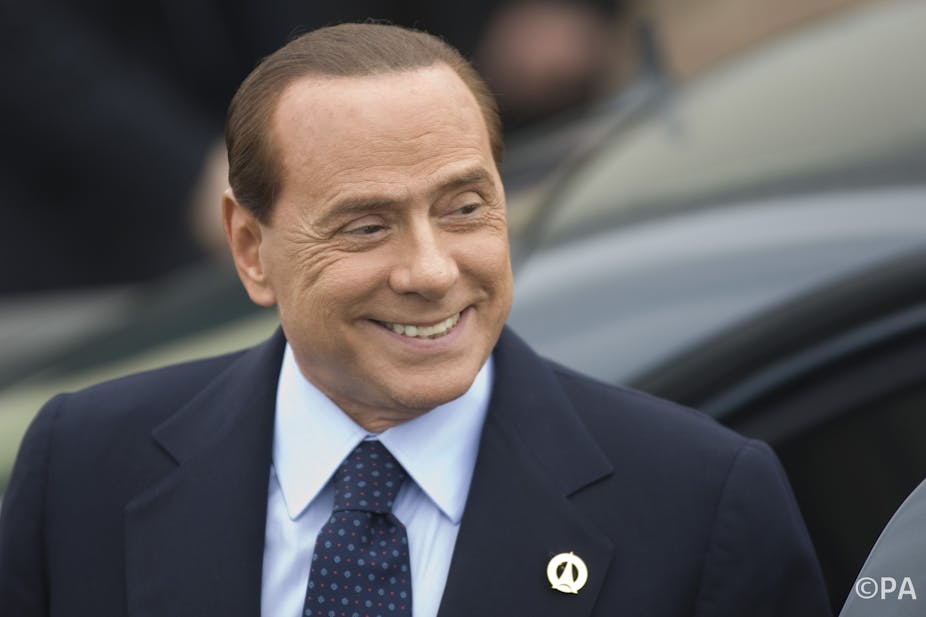Silvio Berlusconi has finally learned the outcome of being found guilty of tax fraud last May. He was originally sentenced to four years in prison, but Italian law prevents over-70s from doing prison time, while a rule he passed himself saw three of those years waived anyway. The 77-year-old former prime minister was sentenced to half a day a week of community service for one year and banned from running for public office for two years.
This is the first time Berlusconi has been sentenced in Italy’s highest court, the Court of Cassation. Plenty of other court cases have found him guilty only to fall foul of statutes of limitations, amnesties, annulments on technicalities, or changes in the law made by Berlusconi himself. Only in a handful of cases has he been acquitted.
The very foundations of Berlusconi’s political project are dubious at best. For a start, he should not have been allowed to run for office: a 1957 law rules out those in receipt of state contracts from running for public offices that might conflict with their private interests. Despite his longstanding control over large parts of Italian broadcasting, this law was never applied.
With friends like these
The other two founders of Berlusconi’s Forza Italia party – his right-hand men, Marcello Dell’Utri and Cesare Previti – have been tainted by corruption and/or connections with organised crime.
Cesare Previti has twice been found guilty of corruption involving business deals in Berlusconi’s favour, and has been permanently banned from public office.
Days before a Cassation Court ruling on whether he was guilty of acting as a Cosa Nostra bridge man with the political class, Marcello Dell’Utri fled to Beirut for medical treatment. His party claimed he was on a diplomatic mission, sent with Vladimir Putin’s blessing to attempt to smooth Lebanon’s fractious politics by speaking to President Gemayel. Unfortunately for him, Gemayel denied all knowledge of Dell’Utri. He was declared a fugitive and arrested pending extradition.
Berlusconi himself was a member of the masonic lodge Propaganda Due (P2) which aimed to subvert Italian democracy in the 1970s. It counted politicians, military men, businessmen and mafiosi amongst its members. Its discovery in 1981 prompted the government’s resignation. For years Berlusconi employed as a stable hand notorious Cosa Nostra killer Salvatore Mangano.
Roll up for a pizza the action!
With the exception of the Five Star Movement (M5S), this theatre of the absurd around Berlusconi’s latest court appearance has passed yet again virtually without comment by Italy’s major political players. Berlusconi may be weakened, but he remains a crucial supporter of Italy’s new government.
Abroad, Italian politics is often seen as a kind of circus show, a playground for corruption and organised crime, or simply the result of a culture of acceptance. Between Berlusconi’s sexual antics and cases of illegality such as those outlined above, it is easy to see why.
But it would be a mistake to dismiss Italian politics as an aberration. The rise of the Five Star Movement to become Italy’s largest single political group demonstrates that there is nothing inevitable about this state of affairs. Railing against corruption in public life, the M5S was beaten to a parliamentary majority by a handful of votes at last year’s general election. This was only thanks to the centre-left and Berlusconi’s minuscule coalition partners.
So what keeps this Italian political caste together? The lack of pressure from abroad, particularly from the EU, has bolstered the political elites’ credibility. Within Italy, the political elites have a shared responsibility in plundering national resources for their own political and personal advantage. Such politicians can be blackmailed. This threat of “mutual assured destruction” has been used to explain the solidarity that centre-left governments have shown their supposed political opponents.
Made in Italy
The net result of this intolerance towards the rules of the state is that Italy has corruption conservatively valued at an annual €60 billion, tax fraud at €120bn, and organised crime worth €150bn. Italy’s richest citizens are meanwhile estimated to have hidden about €160bn in tax havens.
Former head of the Bank of Italy and current ECB director Mario Draghi called tax evasion “social butchery” because it shifted the burden of payment onto the poor and vulnerable. If this is true, Italy’s political class has spent the past two decades sharpening the knife.
Following the economic crisis, Italy’s austerity programme is among the toughest in Europe. Large swathes of the population languish between unemployment, underemployment, increasingly precarious working conditions, low wages, and vanishing welfare support.
The deeper problem is neither Berlusconi nor even Italy: it is that Italy is far from unusual in contemporary Europe. Seemingly untouchable elites and complacent international counterparts fail to address growing wealth inequality and the perception of increasingly unrepresentative politicians. This is a very dangerous mix. Italy, Greece and Spain are merely the front line, and Berlusconi just its most obvious symptom.

